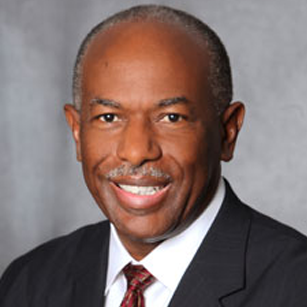Profile
James E.K. Hildreth, PhD, MD
Co-Program Director Director | MMC Admin
Executive Committee Member
Biography
James E.K. Hildreth, PhD, MD serves as Co-Program Director of the CFAR and the President and CEO of Meharry Medical College. As a leading HIV research scientist since the beginning of the epidemic, he provides scientific vision and leadership, and promotes the expansion of all types of HIV research and training at Meharry. He works to foster collaborations within and across the CFAR institutions, improve communications and outreach to the community, and develop productive inter-CFAR partnerships with colleagues at other academic institutions. More broadly, Dr. Hildreth is leading the technological, academic and clinical transformation of the nation’s largest private historically Black academic health sciences center. Focusing on the future of an organization with challenges represented by constant changes in higher education and health care, he has positioned Meharry for continued growth, success and impact through innovative programs, strategic partnerships and entrepreneurial culture.
More About James E.K. Hildreth, PhD, MD
Independent Research
As a research scientist engaged in HIV research since 1987, my laboratory has advanced the field with more than 130 peer-reviewed publications and 11 patents. During my career I have trained 19 PhD students and several postdoctoral fellows, many of whom have gone on to have successful careers in science or science-related areas. I have received a National Institute of Health Director’s Pioneer Award given each year to a few select scientists of exceptional creativity who use pioneering approaches to major biomedical or behavioral research challenges. My laboratory was one of the first to demonstrate that the virus acquires host proteins from infected cells and that the host proteins retain their function. We identified the first protein other than CD4 (LFA-1) that played a direct role in HIV-1-medicated membrane fusion and virus infection. Studies designed to identify mechanisms for host protein acquisition by HIV- 1 led to the first description of cellular lipid rafts as assembly platforms for virus release and as crucial for virus entry as well. Our paper was followed by numerous others confirming the role of lipid rafts in the biology of a large number of enveloped viruses. The Hildreth laboratory also was first to demonstrate the pivotal role of cholesterol in HIV-1 biology and that it is required for both virus entry and release. There is now wide recognition of the importance of this lipid in the biology of many viruses, including several pathogenic human viruses. In collaboration with my colleague, Dr. Stephen Gould, my laboratory proposed that HIV-1 could be considered a “Trojan exosome” based on biochemical, cell biological and immunological data. This hypothesis generated substantial interest and stimulated a number of studies aimed at proving or disproving the hypothesis. The role of exosomes in retrovirus biology is now the subject of numerous investigations originating in large part by our early work in this area. Finally, the most
recent study in my laboratory is to define a mechanism which may explain high transmission rates of HIV-1 in young women from Africa and other regions. We observed that HIV-1 was able to acquire heterologous envelope glycoproteins from other viruses that co-infect T cells, a process we refer to as “natural pseudotyping,” and primary female genital epithelial cells are infected by pseudotyped HIV-1. The implications of this finding are profound as natural pseudotyping could dramatically increase the likelihood of sexual transmission of HIV-1 by conferring tropism to include epithelial cells in the genital tract that would normally be impervious to the virus.
Academic and Leadership Experience
I graduated from Harvard University magna cum laude in chemistry in 1979 and was selected as the first African-American Rhodes Scholar from Arkansas. I studied the biology of cytotoxic T cells with Professor Andrew McMichael at Oxford and graduated with a Ph.D. in immunology. In 1987, I obtained my M.D. from Johns Hopkins and joined the Hopkins faculty as assistant professor. In 2002, I became the first African American in the 125-year history of Johns Hopkins School of Medicine to earn full professorship with tenure in the basic sciences. In July, 2005, I was recruited as the founding director of the NIH-funded Center for AIDS Health Disparities Research at Meharry Medical College. While at Meharry, I was the Program Director of the Research Centers in Minority Institutions (RCMI) at Meharry, of the RCMI Clinical and Translational Research Center (MeTRC) and co-Director of the Vanderbilt-Meharry Center for AIDS Health Disparities Research. In 2008, I was elected to the Institute of Medicine. In 2011, I became Dean of the College of Biological Sciences at University of California, Davis. In 2015, I returned to Meharry Medical College to serve as the 12th President and Chief Executive Officer. I currently serve on two FDA advisory committees (VRBPAC and AMDAC). In 2021, I was appointed by President Biden to COVID-19 Health Equity Task Force, and in 2023 I was appointed to the Scientific Management Review Board, which advises the HHS Secretary and the NIH Director on the structure, function, and operations of the NIH. I serve as Co-Program Director of the Tennessee Center for AIDS Research.
